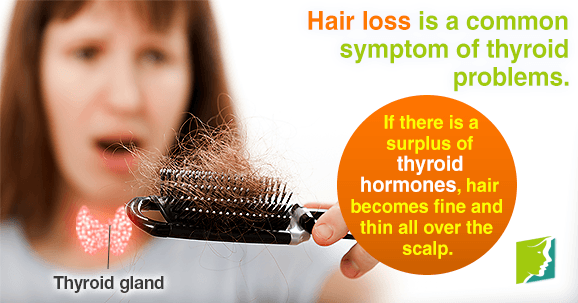Thyroid problems include the thyroid gland being either underactive or overactive. Underactive thyroid (hypothyroidism) and overactive thyroid (hyperthyroidism) can cause a number of health problems, affecting your weight, mood, and hair growth. Hair loss is a common symptom of thyroid problems. The thyroid is also affected by other healthy bodily functions, so it is important to maintain a healthy and active lifestyle. There are several things you can do to manage thyroid problems and hair loss.
Thyroid Problems
Thyroid problems develop over time and tend to become apparent during menopause, menstruation, or during pregnancy, when sex hormone levels are in flux. Most thyroid problems occur within the thyroid gland and often are not apparent until a broad pattern of hormone imbalance develops.
Since hair growth depends in part on the hormones produced by the thyroid gland, if that balance is off, it causes hair loss. If there is a surplus of thyroid hormones, hair becomes fine and thin all over the scalp. Additionally, thyroid problems can cause a number of other bothersome symptoms, such as changes in mood, insomnia, weight changes, abnormal menstruation, muscle pain or weakness and hair loss.
Hair Loss
Hormone fluctuations is one of the most common causes of hair loss. The decrease in estrogen levels during menopause allows for a decrease in its ratio to other hormones, like testosterone.
Testosterone is the main hair-producing hormone in the body. However, testosterone also shrinks the hair follicles, so when female hormones drop, testosterone dominance causes female-pattern hair loss.
Managing Options
Typically, once you start treating thyroid problems, the symptoms - like hair loss - begin to resolve themselves as well. Seeing a doctor will be helpful for them to determine what kind of thyroid problem you are dealing with and the appropriate medication to prescribe for it.
In addition to getting medical treatment, maintaining a healthy and active lifestyle can help restore hormone balance. Hot oil treatments can also be beneficial in promoting healthy hair growth. Using warm natural oils works (e.g., coconut, lavender, or jojoba) best for this treatment. After warming up the oil, gently massage it into your scalp, put on a shower cap and leave it in for an hour, then shampoo and rinse. This is relaxing and helps to reduce stress.
Thyroid problems and hair loss are directly linked. Thyroid problems can also affect mood and weight. They develop over time and tend to become apparent when hormones are in flux. It is important to seek medical treatment if you think you are suffering from a thyroid problem. Once you start treating thyroid problems, symptoms usually disappear. In addition to medical treatment, which is simple dose of thyroid hormones, it is helpful to maintain a healthy and active lifestyle. Read more useful information on treating hair loss.
Sources
- Mayo Clinic Staff. (2012). Hypothyroidism (underactive thyroid). Retrieved November 14, 2014, from http://www.mayoclinic.org/diseases-conditions/hypothyroidism/basics/symptoms/con-20021179
- National Institutes of Health. (2014). Hypothyroidism. Retrieved November 14, 2014, from http://www.nlm.nih.gov/medlineplus/ency/article/000353.htm




